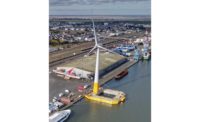Rising construction costs have cancelled one of Europe’s largest offshore wind projects set to be built off England’s east coast. Sweden’s state-controlled developer Vattenfall AB said it will terminate its 1.8-GW Norfolk Boreas project in the North Sea for the UK, writing off $530 million in costs and termination fees.
“We have seen cost increases in the supply of offshore wind of up to 40% ... for the entire market,” said Vattenfall President and CEO Anna Borg, in announcing the firm's half-year results. “Of course it hits projects that are in development especially.”
The project is one of three in Vattenfall’s program covering more than 500 sq miles of the U.K. Norfolk Zone with the nearest turbines about 30 miles from shore. The firm's nearby Vanguard East and West projects, totaling another 1.8 GW, are less well developed than Boreas and have yet to secure price contracts with the government.
“We are closely now monitoring the [Vanguard] situation,” said Helene Biström, head of the company’s wind energy business. On Boreas, “we actually locked in the prices … in a contract for difference with the U.K. state over a year ago when market conditions were completely different,” she said. “It simply doesn’t make sense to continue this project.”
Vattenfall is not alone in feeling the effects of inflation. The 2.85-GW Hornsea Three field, off the Norfolk coast, is also feeling cost stress, according to Mads Nipper, CEO of the project's Danish owner, Ørsted A/S. The project would likely go ahead, but the government would have difficulty in future lease auctions at current prices, he told the Financial Times last month.
With the U.K. relying heavily on offshore wind to meet its carbon emission targets, Vattenfall is "not the only actor in this situation,” Bistrom said. "Together now with the government and others we need to [ensure] that the incentives to actually continue investment in offshore wind are there because [there are] a lot of projects ready to build.”





Post a comment to this article
Report Abusive Comment